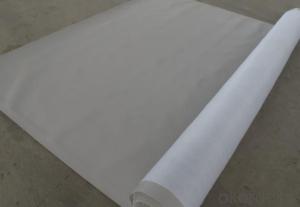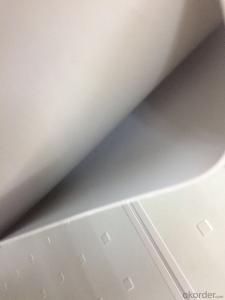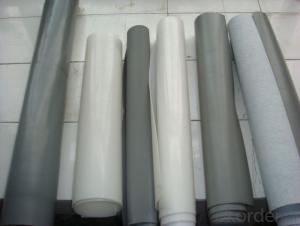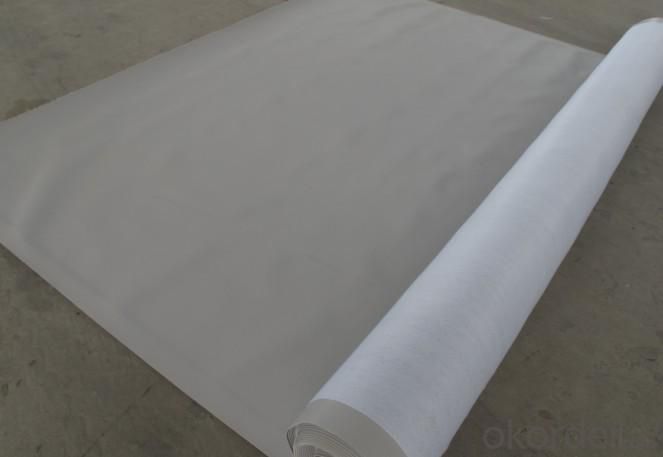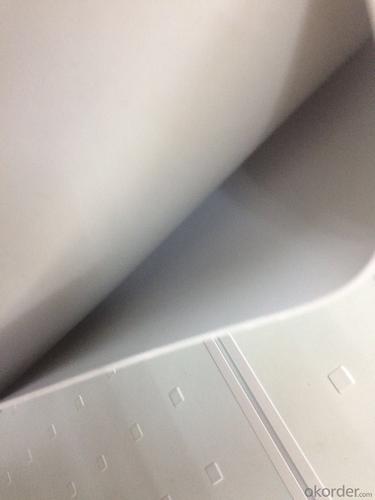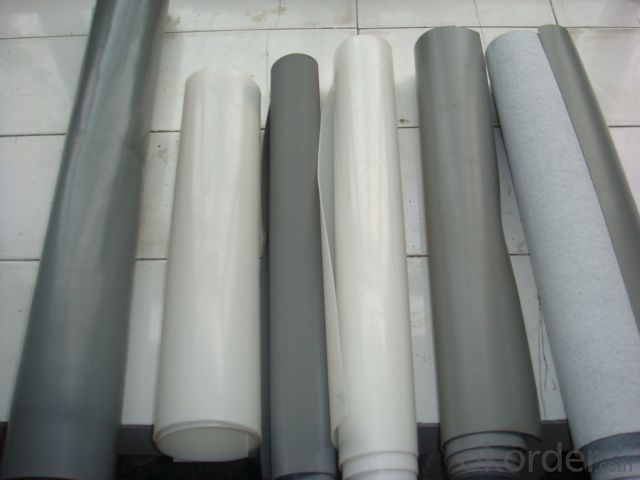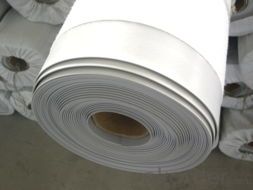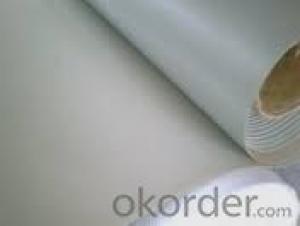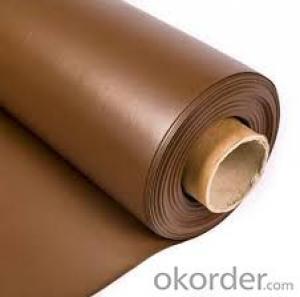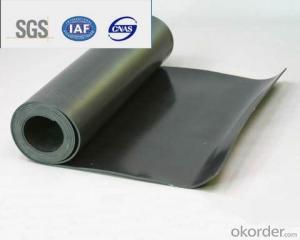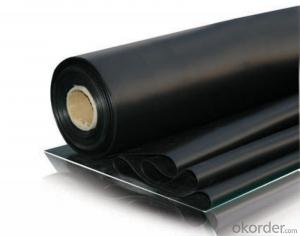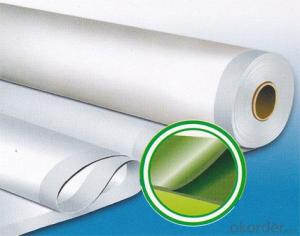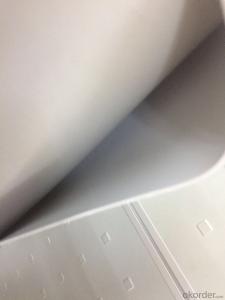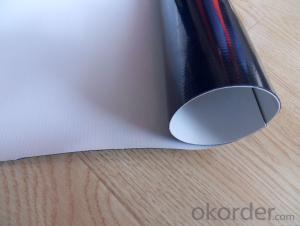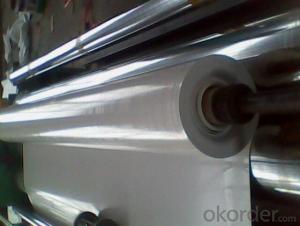PVC Waterproofing Membrane 1.5mm with Good Quality
- Loading Port:
- China Main Port
- Payment Terms:
- TT or LC
- Min Order Qty:
- 5000 m²
- Supply Capability:
- 100000 m²/month
OKorder Service Pledge
OKorder Financial Service
You Might Also Like
PVC waterproofing membrane
Polyvinyl Chloride (PVC) waterproof membrane is a new polymer waterproof membrane which is made from polyvinyl chloride resin, and mixed with plasticizer, filler, antioxygen, ultraviolet absorber and other auxiliaries.
Product Applications:
1. All kinds of roofs, such as steel structure roof, planted roof etc.
2. Underground engineering, such as basement, subways, tunnels, air raid shelter, etc.
3. Other projects like artificial lake, dam, water reservoir, grain storehouse, etc.
Product Features:
1. Excellent aging resistance.
2. Root resistant penetration, specially used on planting roof.
3. Welding installation. Joints are solid and environment friendly, no pollution.
4. High tensile strength, good elongation and dimensional stability.
5. Good plasticity, easy and suitable for details installation.
6. Fireproof. Fire extinguished out of the ignition resource.
7 Surface is smooth, no fading and dirty resistant.
Product Specifications:
1. Size: 2.05(width)*20m (length)
2. Thickness: 1.2mm; 1.5mm; 2.0mm
3. Type: Homogeneous, Reinforced, Fabric back
4. Exposed and Non-exposed
5. Color: white, Grey or customized
6. Certificate: ISO9001/14001
FAQ:
Q: Can I visit your company?
A: Yes, welcome to visit our enterprise.
Q: Can I do the third party testing before loading?
A: Yes, we could accept the third party testing.
Q: Which kind of payment in your company?
A: We could accept TT, LC at sight, etc.
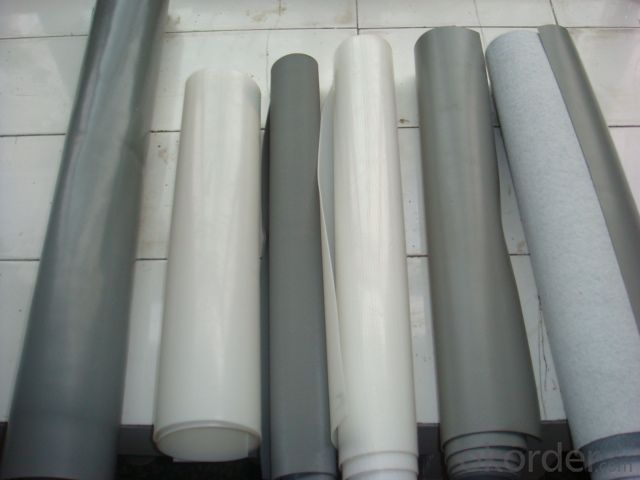
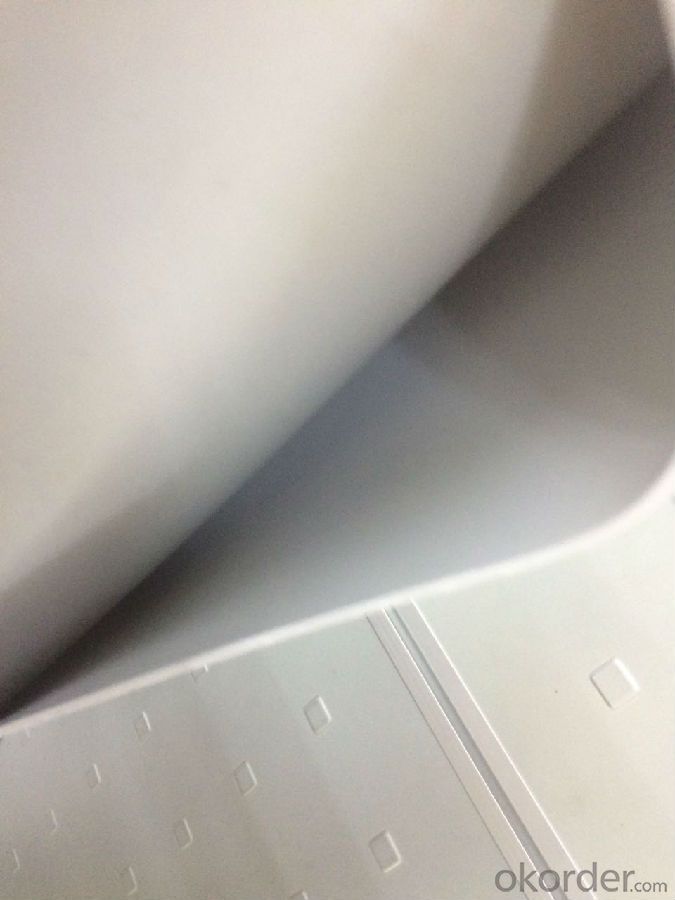
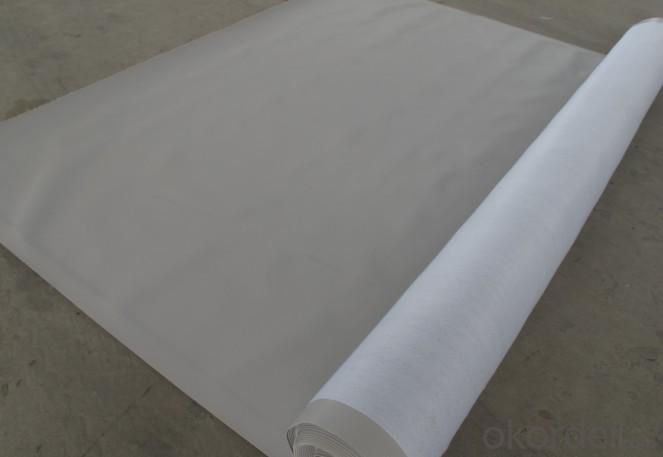
- Q: Can a waterproofing membrane be used for theaters or concert halls?
- Yes, a waterproofing membrane can be used for theaters or concert halls. Waterproofing membranes are commonly used in construction projects to prevent water infiltration and protect the building from water damage. The membrane is applied to surfaces such as walls, floors, and roofs, creating a barrier that prevents water from seeping through. In theaters and concert halls, where the protection of the building structure and equipment is crucial, waterproofing membranes can be highly beneficial. They can help prevent water damage to sensitive equipment, such as audiovisual systems, lighting fixtures, and musical instruments. Additionally, a waterproofing membrane can help maintain a dry and comfortable environment for both performers and audience members by preventing water leakage and moisture buildup. Overall, using a waterproofing membrane in theaters or concert halls can help ensure the longevity and functionality of the building while providing a safe and enjoyable experience for everyone involved.
- Q: Are waterproofing membranes suitable for underground parking garages?
- Yes, waterproofing membranes are suitable for underground parking garages. They provide an effective barrier against water infiltration, preventing damage to the structure and protecting against potential leaks and moisture-related issues. Waterproofing membranes are designed to withstand the high water pressure typically associated with underground environments, making them an ideal solution for ensuring the longevity and durability of underground parking garages.
- Q: Can a waterproofing membrane be used in coastal areas?
- Indeed, the utilization of a waterproofing membrane is viable in coastal regions. Given their susceptibility to copious amounts of moisture and water exposure, it becomes imperative to implement efficient waterproofing measures. By appropriately installing and upkeeping a waterproofing membrane, one can establish a protective barrier, effectively thwarting water infiltration and averting structural damage while ensuring their longevity. Nevertheless, it is crucial to opt for a membrane specifically tailored for coastal environments as they exhibit heightened resistance to saltwater and possess superior durability to withstand the harsh coastal conditions. Moreover, routine inspection and maintenance are imperative to guarantee the continued efficacy of the waterproofing membrane in coastal areas.
- Q: Can waterproofing membranes be used on outdoor fountains?
- Indeed, outdoor fountains can benefit from the application of waterproofing membranes. The primary purpose of these membranes is to establish a protective shield that thwarts water infiltration, rendering them an excellent choice for safeguarding outdoor fountains against water-induced harm. Typically composed of water-resistant materials like rubber, PVC, or bitumen, these membranes effectively seal the fountain's structure. By applying a waterproofing membrane to an outdoor fountain, one can extend its longevity, avert leaks, and shield it from the elements.
- Q: Can a waterproofing membrane be used for a basement?
- Yes, a waterproofing membrane can be used for a basement. In fact, using a waterproofing membrane is highly recommended for basements as it helps to prevent water infiltration and moisture buildup. A waterproofing membrane is a thin layer of material that is applied to the basement walls and floor, creating a barrier against water. It acts as a protective shield, preventing water from seeping through the walls and causing damage to the foundation and interior of the basement. Additionally, a waterproofing membrane can also help to reduce the risk of mold and mildew growth, as it keeps the basement dry and moisture-free. Overall, using a waterproofing membrane is an effective solution for keeping basements waterproof and ensuring a safe and dry living space.
- Q: Can a waterproofing membrane be used on underground parking structures?
- Using a waterproofing membrane on underground parking structures is indeed recommended. This is because these structures are at risk of water infiltration due to their below-ground location and proximity to the water table. To prevent water from seeping into the structure and causing damage, a waterproofing membrane acts as a barrier. It safeguards against issues such as deterioration, corrosion, and the growth of mold. By maintaining the structural integrity of the parking facility, it extends its lifespan. Moreover, a properly installed waterproofing membrane can also protect against other sources of moisture, such as rainwater runoff or groundwater. Ultimately, it is crucial to use a waterproofing membrane to ensure the long-term durability and functionality of underground parking structures.
- Q: Can a waterproofing membrane be used for a parking lot?
- Yes, a waterproofing membrane can be used for a parking lot. A waterproofing membrane is designed to provide a protective barrier against water infiltration and can be applied to various surfaces, including parking lots. It helps to prevent water damage, such as cracks and deterioration caused by freeze-thaw cycles, and can extend the lifespan of the parking lot. Additionally, a waterproofing membrane can also help to mitigate the risk of costly repairs by preventing water from seeping into the subbase and compromising its stability. Overall, using a waterproofing membrane for a parking lot can be a smart investment to enhance durability and longevity while minimizing maintenance needs.
- Q: Can a waterproofing membrane be used for an industrial facility floor?
- Yes, a waterproofing membrane can be used for an industrial facility floor. Waterproofing membranes are commonly used in industrial settings to protect floors from water damage and to prevent moisture from seeping into the concrete or substrate. These membranes are designed to create a seamless and impermeable barrier that can withstand heavy foot traffic, industrial equipment, and chemical spills. They can also provide additional benefits such as resistance to mold and mildew growth, increased durability, and easier maintenance. However, it is important to choose a waterproofing membrane that is specifically designed for industrial applications and to follow the manufacturer's instructions for proper installation and maintenance.
- Q: Are waterproofing membranes resistant to hydraulic oils?
- No, waterproofing membranes are not typically resistant to hydraulic oils.
- Q: What is the cost of installing a waterproofing membrane?
- The cost of installing a waterproofing membrane can vary depending on several factors such as the size of the area to be waterproofed, the type of membrane used, and the complexity of the installation. On average, the cost can range from $3 to $10 per square foot. However, it is recommended to obtain quotes from professional contractors to get an accurate estimate for your specific needs.
Send your message to us
PVC Waterproofing Membrane 1.5mm with Good Quality
- Loading Port:
- China Main Port
- Payment Terms:
- TT or LC
- Min Order Qty:
- 5000 m²
- Supply Capability:
- 100000 m²/month
OKorder Service Pledge
OKorder Financial Service
Similar products
Hot products
Hot Searches
Related keywords
